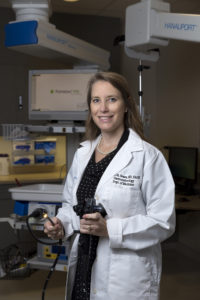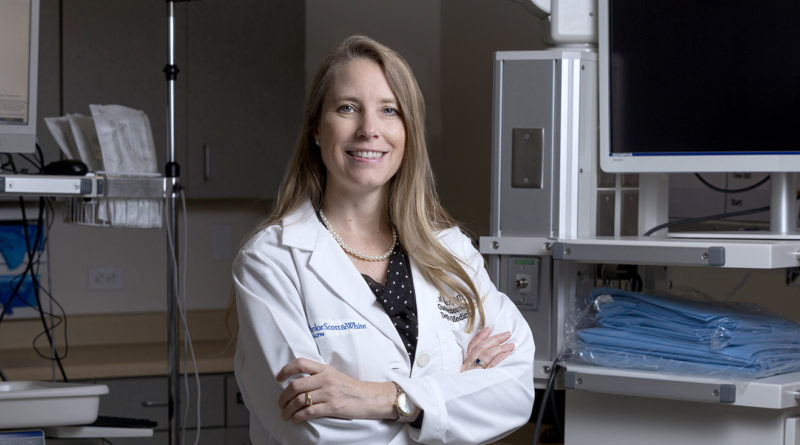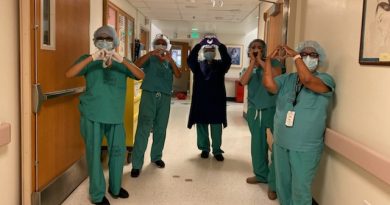Spreading the healthy lifestyle gospel—one water bottle at a time
By Stacy Moser
Photography by RUSTY SCHRAMM, courtesy of Baylor Scott & White Health
The term fast forward comes to mind when you speak with Dr. Dawn Sears. The clip of her speech is rapid, her mannerisms are swift and graceful and her demeanor is quick and perceptive. This is a woman who moves through her day at full speed, making the most of every moment.
 Her trajectory of achievement in the medical profession, fueled by a drive instilled in her by her hard-working parents, has earned her a stellar reputation as chief of gastroenterology at Baylor Scott & White Medical Center–Temple. She has already accomplished a great deal in life, but one senses that she is only beginning to make her mark in the world.
Her trajectory of achievement in the medical profession, fueled by a drive instilled in her by her hard-working parents, has earned her a stellar reputation as chief of gastroenterology at Baylor Scott & White Medical Center–Temple. She has already accomplished a great deal in life, but one senses that she is only beginning to make her mark in the world.
Dawn reflects on her decision to become a doctor, and she recalls a pivotal moment when she was a teen, not long after her family relocated from Vermont to Melbourne Beach, Florida, 20 miles south of Cape Canaveral.
“I remember reading about the space shuttle and then we moved right by the Cape. That was really exciting. Several of my classmates’ parents worked at NASA and we got to see all the space shuttles go up. I was sure I was going to be an astronaut. One day, though, I was at school when the Challenger blew up and we went outside and saw pieces of it fall from the sky. It just kept exploding and exploding,” Dawn’s voice trails off as she recalls the emotions of that day. “It was a shock. I realized that space is not where I wanted to serve. But the experience convinced me to do something in science, something that’s relevant.”
Dawn attended Texas A&M Medical School after graduating from Texas Women’s University. “I decided to do family medicine; I thought I could be the woman’s woman, deliver babies, taking care of women cradle to grave.” As the time came to make a final choice about her residency, though, she found herself unsure.
“I’d see the internal medicine docs hanging around—who are complete nerds—they’re mad scientists. And I realized, dang it, I’m a nerd too.” Dawn called her fiancé, Will Sears, to discuss her last-minute decision before the time expired for her to make a change. “I said, ‘Honey, I’ve changed my mind.’ He answered, ‘You don’t want to get married?!’ I said, ‘No! I want to get married, but I want to switch to internal medicine.’”
“One of my first rotations was gastroenterology. I’d seen a gastroenterologist once and thought, ‘Why would you ever do this? This is gross!’ I wasn’t interested at all. But I loved working in the intensive care unit, dealing with people teetering on the edge of life. There was something magical happening. There would be a bleeder at 3 a.m. and the gastroenterologist would come in and close the curtain,” Dawn pantomimes a dramatic flourish of the curtain around a patient’s bed. “Then he’d do something—then swish! The curtain would open. And the patient’s pulse and blood pressure stabilized, she no longer needed a blood transfusion. I wanted to know what happened behind that curtain? What was the magic? That’s why I chose this field.”
After years of diagnosing thousands of patients’ ailments, she began to observe patterns. “I saw that nutrition and lifestyle were 80 percent of the cause of their problems. They came to me with cirrhosis, fatty liver, reflux or irritable bowel. I saw over and over that the culprit was their lifestyle. It was sodas, fast food, not walking, staring at a computer—it was lifestyle! I dove into the literature so I could explain why these things are bad for you. I developed a talk that I give at conferences. I call it my soda-hating talk, ‘Eat Food, Not Chemicals.’ When I’m invited to a conference, I’m often asked to give the speech on Day One, because the conference’s soda expense drops in half when everybody has water for the rest of the time,” she laughs.
Dawn admits that a difficult part of her job is delivering bad news to her patients. “I’ve found that I have a real gift for walking people through death and dying,” she explains. “I’m not afraid of dying. I became a Christian through all of this. I’m privileged to walk families and patients through the natural cycle of life. Having those intimate, incredible relationships is an honor that I do not take lightly.”
Her challenges don’t stop with her professional life. She is the mother of three children—her youngest daughter is afflicted with global developmental delay, which is an intellectual disability; autism spectrum; ADHD and also cyclic vomiting syndrome. “If she gets too happy, too sad, too excited, too mad, she starts vomiting and won’t stop. Usually I can give her drugs at home that stop the vomiting. But sometimes we end up in the hospital, where I need to be the mom and not her doctor. It’s a tough balancing act.”
Dawn is acutely aware of the moments of self-doubt that plague her and other women around her. She is a tireless, self-appointed advocate for her young colleagues, especially female doctors like herself, who strive to be both mothers and high-achievers. She feels strongly that those goals, while admirable, can be destructive to their quality of life.
“A person who goes to medical school, by definition, is almost always a ‘Type A,’ a perfectionist. But you must become a ‘Type A minus’ so you don’t drive yourself crazy,” she says. “I was told to work hard, focus on my dreams and I can have it all. That is absolutely false. Everything suffers if you try to do it all perfectly. There is no Superwoman! That’s the constant daily tension for doctors who are mothers.” She pauses as she explains her deepest concern. “Women physicians have the highest rate of suicide of any occupation,” she says ruefully. “I’m starting to call it Impossible Syndrome. We can’t do it all.”
Excitement returns to Dawn’s voice, though, as she describes her latest passion. “There was a huge study showing that in bad health outcomes in children, like cancer, asthma, early death or behavior issues—the highest prevalence occurred when a child’s nuclear family was broken. So keeping a nuclear family intact can decrease all of these negative outcomes for kids.”
“Often the last time teenaged boys have a person in their life that they respect and who is invested in them is their coach,” she says. “So I felt called to go to Temple High School to talk to the football team about the importance of health and forming permanent, positive relationships with women.” She approached the school’s football coach, Scott Stewart, with the idea three years ago and, to her surprise, he upped the ante. “He asked me to come every week, all summer!”
She brings food to her talks (“How else do you get boys to show up? Bring food!” she chuckles). “We talk about real nutrition and the effects of video games on sleep. Eighty sweaty boys on the locker room floor are asking me all sorts of questions about STDs or asthma, addiction, surgery, porn—and I’m just able to be real with them.”
Dawn leans back in her seat, proudly grinning. “Temple High wasn’t supposed to go to the playoffs over the last few years, but they did! This is how we change our next generation. And if we can keep these boys united with their ladies, their healthcare issues will improve. And that’s how you change things.”




